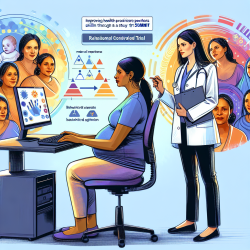Introduction
The field of maternal mental healthcare is rapidly evolving, with innovative approaches being tested to improve access and outcomes for perinatal women experiencing depression and anxiety. The SUMMIT study, "Scaling Up Maternal Mental healthcare by Increasing access to Treatment," is a pioneering randomized controlled trial that examines the effectiveness of telemedicine and non-specialist providers (NSPs) in delivering behavioral activation (BA) therapy. This blog explores the implications of the SUMMIT study for practitioners seeking to enhance their skills and expand their service delivery models.
Background
Perinatal depression and anxiety are prevalent conditions affecting up to 20% of pregnant and postpartum women globally. Despite the availability of effective psychological treatments, access remains limited due to barriers such as a shortage of specialized providers, logistical challenges, and stigma. The SUMMIT study addresses these barriers by evaluating the non-inferiority of BA therapy delivered by NSPs compared to specialists, and via telemedicine compared to in-person sessions.
Study Design and Methodology
The SUMMIT trial is a multi-center, four-arm study involving 1,368 participants. Women with significant depressive symptoms, as measured by the Edinburgh Postnatal Depression Scale (EPDS), are randomized into one of four groups: telemedicine specialist, telemedicine non-specialist, in-person specialist, and in-person non-specialist. The primary outcome is the reduction in depressive symptoms at three months post-randomization, with secondary outcomes including anxiety, trauma symptoms, and quality of life.
Key Findings and Implications
Preliminary findings from the SUMMIT study suggest that BA therapy delivered by NSPs via telemedicine is non-inferior to traditional specialist and in-person models. This has significant implications for practitioners:
- Expand Service Delivery: Telemedicine offers a flexible and scalable solution to reach more patients, particularly in underserved areas.
- Utilize Non-Specialist Providers: Training NSPs in BA therapy can alleviate the burden on specialized providers and increase treatment accessibility.
- Implement Behavioral Activation: As an effective and easy-to-implement therapy, BA can be a valuable addition to a practitioner's therapeutic toolkit.
Encouraging Further Research
The SUMMIT study highlights the potential for telemedicine and NSPs to transform maternal mental healthcare. Practitioners are encouraged to explore these models further and consider conducting their own research to validate and refine these approaches in different settings. Engaging in collaborative studies and sharing findings can contribute to a broader understanding and implementation of these innovative solutions.
Conclusion
The SUMMIT study provides compelling evidence for the use of telemedicine and NSPs in delivering effective maternal mental healthcare. By embracing these models, practitioners can enhance their skills, improve access to care, and ultimately create better outcomes for perinatal women. For those interested in delving deeper into the research, the original study can be accessed through this link: Scaling Up Maternal Mental healthcare by Increasing access to Treatment (SUMMIT) through non-specialist providers and telemedicine: a study protocol for a non-inferiority randomized controlled trial.










